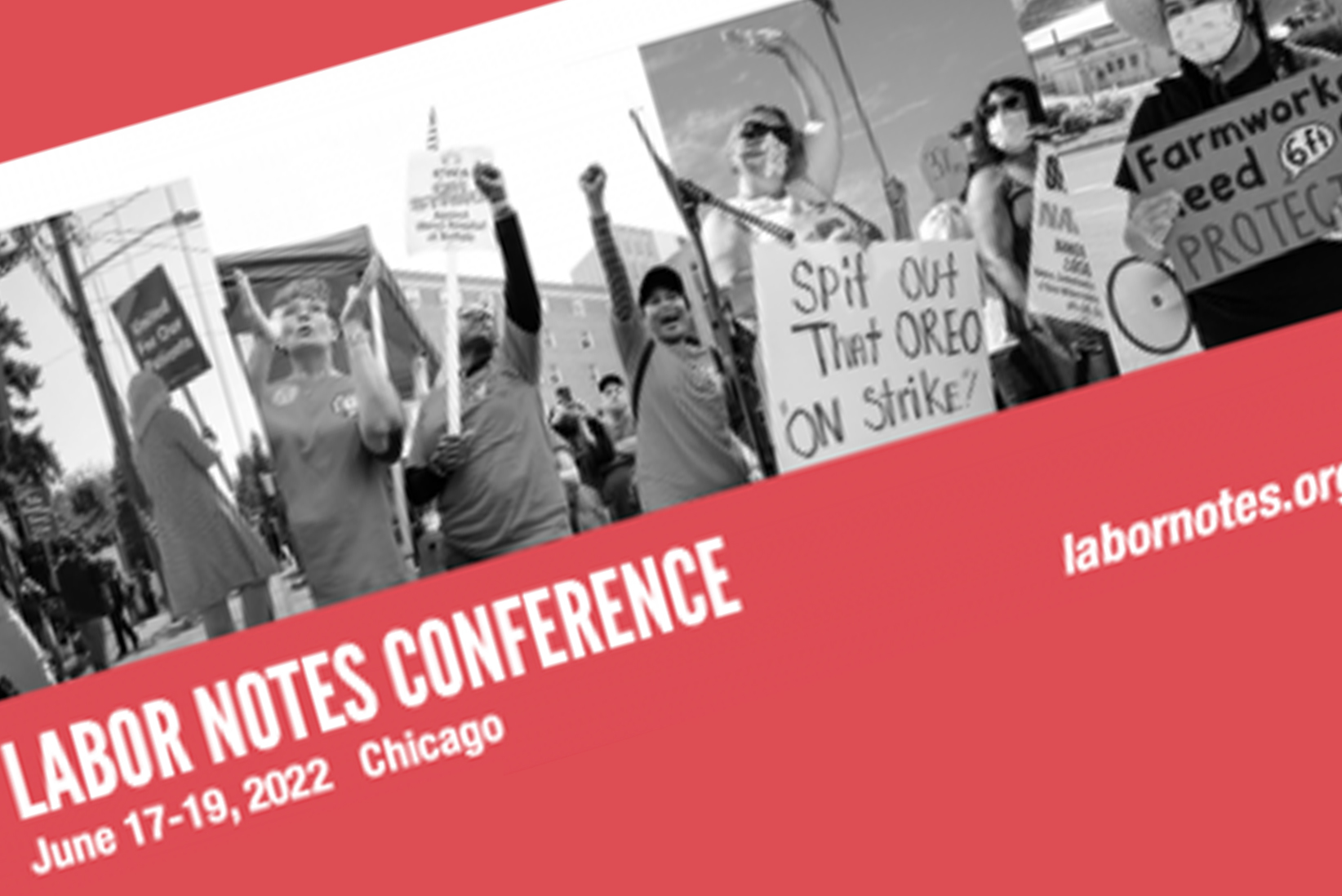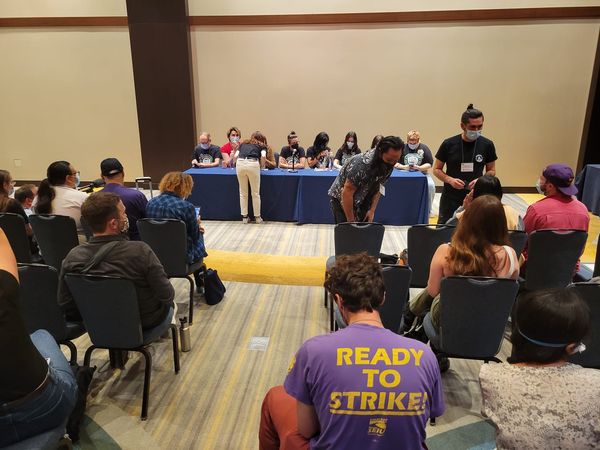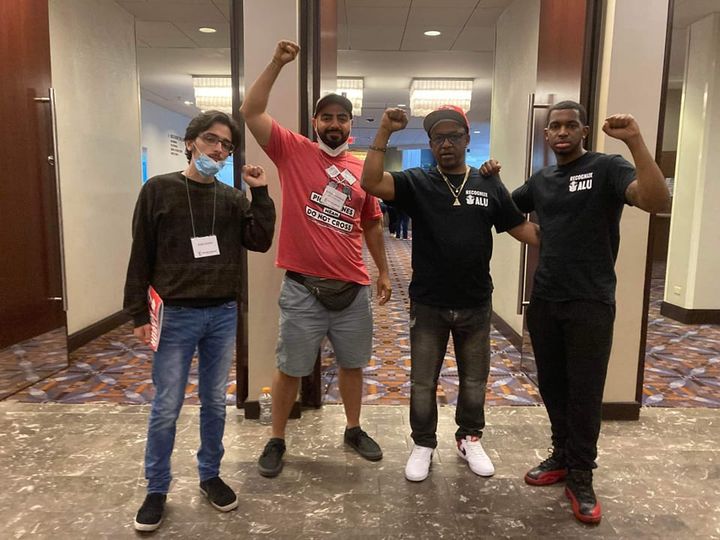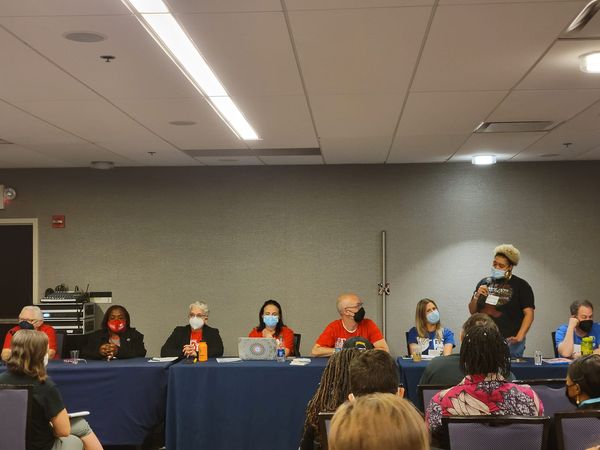
On the weekend of June 17 to 19, thousands of labour activists converged in Chicago, Illinois for the Labor Notes 2022 bi-annual conference. With the crisis of capitalism forcing more and more workers to find a way to get organized and fight back, the conference brought together activists from across the movement: from newly unionized Starbucks and Amazon workers, to seasoned trade unionists including teachers, miners, flight attendants, and more. Members of Fightback and Socialist Revolution, respectively the Canadian and U.S. sections of the International Marxist Tendency, intervened with a delegation of a dozen members. Some important lessons can be drawn from the speeches, workshops and discussions.
Starbucks workers detail courageous battles
Starbucks and Amazon workers have been at the center of the recent wave of unionizations that have inspired the newly awakened American working class, and their leaders were in attendance at the conference.
Dozens of newly unionized members of Starbucks Workers United (SWU) from New York to Florida held a panel on the Friday afternoon entitled: “A Union Brews at Starbucks”. One panelist from Buffalo, New York, where the unionization drive originated, mentioned how she only learned about unions after she felt the need to organize her workplace. Soon after googling it, she determined that a union was exactly what she and her coworkers needed, and she began the task of building it. Her story highlights how rapidly workers are radicalizing due to the exploitation of employers like Starbucks.

Another panelist from Mesa, Arizona said that she worked 10 hours without a single break, and this was the breaking point that inspired her to unionize. A panelist from Florida said that the right-to-work laws in the state, rather than dissuading her, actually galvanized her to fight against such a draconian system: “It wasn’t easy as we had to fight the right-to-work mentality among workers in the South.” Once the petition to join the union was filed, they “began the growing southern movement.” One panelist from Oklahoma talked about how they had to initiate national and regional training to fast-track education for unionizing organizers across the country, from how to report grievances, to sharing all kinds of knowledge and resources that many trade unionists in other sectors already had access to. Going from not knowing what a union is, to successfully organizing across the country, Starbucks workers are learning on their feet and showing how quickly working-class consciousness and organization can develop.
As fresh to union organizing as they are, their opponents have not gone easy on them either. The cruelty of Starbucks corporate is apparent in their union busting. “They did everything in the book to delay elections,” said one panelist, adding that they also faced an uphill fight against the National Labour Relations Board which had been bolstered against workers by the Trump administration, and which has not changed under Biden. For example, one Starbucks workplace was denied a fair election or date for an election for more than 10 months.
Starbucks preyed on workers’ personal ties by organizing captive audience sessions grouping together siblings and friends, to cause fear and discord among them. Starbucks flooded shops that were being unionized with managers in order to overwhelm the workers. They fabricated false write-ups, and penalized organizers on false pretenses. One worker organizer was accused of spreading COVID-19 because her temperature was slightly higher than usual, despite suffering from sunburn a day earlier.
Starbucks also tried to undercut union organizers by offering increased benefits to workers who were not unionizing. The company waged psychological warfare, taking individual workers aside and going through the demands of SWU to argue that unionization was not in their interest, and that they could lose their jobs if they took part in organizing. One organizer was invited to a captive audience meeting where they immediately found themselves alone with six managers trying to massively pressure them into ending their organizing efforts. Another panelist explained how one of their coworkers recently took a leave of absence due to the psychological pressure, and tragically committed suicide. When asked for time off to grieve their friends’ passing, Starbucks told them that they had “25 days to get over it”.
Meanwhile, customers and community members have flooded to support the workers, showing that the radicalization in consciousness extends beyond those working at Starbucks. At some unionization meetings in Boston, customers came to observe, congratulate and support the workers. When a group of Starbucks organizers now known as “the Memphis Seven” were fired, a coalition of Black trade unionists and unionized bus drivers mobilized support. “[Starbucks] can’t compete with the level of community the working class has for each other,” said one panelist.
The stories that newly unionized Starbucks workers shared over the course of the conference, detailing their creative and determined methods (with some even organizing strikes before being unionized!) were an inspiration, and showed what is possible with militant organizing.
Amazon Labor Union members appeal for support
Fresh off of the groundbreaking victory at the JFK facility in Staten Island, dozens of members of the newly formed Amazon Labor Union (ALU) attended the conference and talked with trade unionists at workshops and on the venue floor.

I spoke to two members of the ALU, Derrick Palmer and Gerald (who preferred not to use his last name), who said that the real battle with Amazon had just begun. After spending two years convincing workers to unionize, and succeeding, now the fight has moved to the courts where ALU lawyers are defending the union’s right to exist against Amazon’s appeals to disband them. We all agreed that this shows how the legal system functions to help corporations in their efforts to undermine the democratic activities of workers. Derrick and Gerald also explained how Amazon was spending tens of millions of dollars to break their spirits, but based on their experience, all of that money meant nothing if workers were organized. This underlined their reason for coming to the conference: to build a network of support with other organized workers to bolster their struggle.
On Friday evening, ALU president Chris Smalls gave a keynote speech to roughly 1,700 people. In his speech Smalls emphasized the need for unity among all of the attendees from various unions and workplaces. He talked about the level of “sacrifice and love” that it took to bring non-unionized workers together, and how the task now was to build on this momentum.
He mentioned the “small window of opportunity” for the labour movement to support the ALU during court proceedings to defend their right to exist. Smalls and other ALU members were banned from those proceedings. Only their lawyers and members of the public were allowed to attend. Smalls made an appeal to the room to join the meetings to build public pressure, as this is far more effective than just a few lawyers trying to convince a group of wealthy adjudicators.
Smalls also appealed to the crowd of trade unionists to begin solidarity actions, saying, “Labor Notes is great, but imagine if the 4,000 of those here walked out right now to protest at an Amazon factory.” Smalls then finished his speech with a series of chants exclaiming “Billionaires, they gotta go!” and “Fuck Jeff Bezos!”
Throughout the conference, Smalls fraternized with hundreds of workers, including at a workshop entitled “Industrial Organizing Principles and Tactics” where ALU organizer Cassio Mendoza and others detailed what inspired them and how they mobilized workers. A highlight of the workshop was its focus on slogans, and ensuring that clear slogans and demands were transmitted to workers on the shop floor. The point was made that you can have the most energetic organizers, but if you do not have a clear message that speaks to the needs of workers, that energy can be lost. Slogans calling for higher pay and benefits were short but boldly presented as demands that the ALU would fight for.
Moving forward from the conference, it is vital that all the unions that showed support to members of the ALU follow through in practice. The ALU now has a national platform to agitate among workers. It must use that platform to cut across the union-busting tactics of Amazon and pro-big business governments at various levels.
As Chris Smalls said in his speech, “If we win, imagine what that can do for the contracts of workers elsewhere.” The victory at JFK was one battle that inspired millions. Now these workers need the support of the organized labour movement to spread the unionization efforts. But that would only be one series of battles in a larger class war. This is a war against not just Amazon but the entire bourgeoisie, their government, and their profit-driven system that will threaten every gain. In other words, it is a war against capitalism. Smalls continues to have a large platform and still has the opportunity to use it to appeal to workers across America to take up this fight.
American teachers’ unions: Militancy in the face of limitations
On Saturday, Marcia Howard of the Minneapolis Federation of Teachers spoke about the dangers of complacency in our struggles as workers. She said teachers, despite their militancy in struggles across the country, are in constant danger of having those gains clawed back. She also spoke of the urgency for unity: “Black liberation is for the liberation of everybody… The fight for black lives is the same fight for our public schools.” Howard, aside from being on the union executive, is part of a volunteer security team at George Floyd Square, the section of Chicago Avenue in Minneapolis where police murdered George Floyd, and where plans for a permanent memorial are underway. Howard is one of the many workers who have taken up the fight against police brutality and racism through their work in the labour movement.
At the “Educators on Strike” session on the same day, teachers from various unions spoke on opposing racist school board and local government policies. An important theme was the need to turn the union fight into a political fight for broader issues. This discussion provided some important lessons for education unions here in Canada who are facing government austerity and possible picket lines soon.
Greta Calahan of the Minneapolis Federation of Teachers described some of their tactics for building unity:
“We coordinated with food service, clerical staff and because we coordinated with them, these other workers got better contracts like us and never had to step out the door…
“…its not over but we are in charge now…
“When George Floyd was killed, the public lynching was filmed by one of our students. Then the pandemic hit. In our school board students of colour were displaced [by gentrification]. Therefore, in negotiations, not only did we have open bargaining [involving rank-and-file members rather than behind-the-scenes negotiating by executives] but livestreamed it on Facebook!”

Debbie Pope of the Chicago Teachers Union elaborated on the same theme:
“We fought for full-time nurses at schools, social workers, librarians, and even focused on homelessness. There are students who don’t have homes. With the terrible things that happen in families, part of our battle was [against the] huge increases in the cost of housing in Chicago…
“We wanted class size relief. Got a victory due to political and legislative work… We won $30 million a year for class size relief versus $7 million proposed. We set up a committee to make it happen…
“But the fight is not over.”
The panelists also spoke on how they built their base of support and power leading up to a strike. It was abundantly clear that whether it was a two-day strike, or a weeks-long strike, when teachers’ unions leveraged the combined power of their members, other workers and the community, that was when the bosses conceded to their demands.
Too often, we see unions who engage their membership in only the most limited way, and who let management control contract negotiations. This was not the case with these teachers’ unions. They spent time speaking one-on-one with teachers in the leadup to a strike vote. And they spent time answering the anti-strike propaganda from the media and government who represent the interests of the capitalists. They had open bargaining to enable members to be more involved. They included the community, and made their struggle political by broadening it beyond just their own issues for wages and benefits. Most importantly, many of them recognize that the fight is far from over and that all their gains are in danger of being clawed back.
On the question of how to sustain a contract, Pope said:
“You never get what you deserve because we live in a capitalist society. Personally I think we need a revolution. You must assess a strike in terms of whether you need to be stronger. Our 2019 strike assessment? Mostly successful. Good entry-level salaries won, some important things. We maintained a positive relationship with parents and the community. Didn’t let liars in the Chicago Tribune have a narrative of teachers being greedy among the vast majority of parents. And when the crisis of the pandemic hit, we ensured that parents felt like we fought for their interests and needs. What was the overall assessment? It was a success. It wasn’t perfect, but it left us in a position where we can build on our position and that’s what counts.”
These statements in many ways provide a good example for Canadian unions to aim for when fighting for not just union demands, but broader community issues.
There was one issue on which the panelists had contradictory views: their approach to the Democratic Party and the possibility of fighting for an actual mass workers’ party separate from the Democrats. The consensus seemed to be that they could not trust the Democrats, but several panelists then explained that there is a possibility to push them “in the right direction”. However, history shows otherwise, as time and time again the Democrats have proven to be a party of the billionaires and capitalist class. If, as Pope said, capitalism is a barrier to workers and we do “need a revolution”, then all of our principles and tactics must coincide with this perspective. The fight for a labour party in the United States, independent from the parties of the rich, is a critical step for the working class to effectively fight for their interests. It is a step towards fighting against capitalism, and for a society where workers actually control their lives. The formation of such a party, based on socialist demands, can and must be fought for. The victories of the teachers, incorporating broader social issues into their struggles, demonstrates that the potential for this exists.
To fight capitalism, labour must fight for socialism
Other prominent figures spoke at the conference on the Friday night. U.S. Senator Bernie Sanders gave a speech about the one per cent owning more than the bottom 92%. He spoke against “Uber” capitalism, “huge profits,” and “extreme corporate profits,” but did not call for any specific action and did not attack capitalism as a system. He did not call for a vote for the Democrats, but he did mention that big corporate money was being channeled to both parties. This, of course, calls into question why he has worked with and supported Democrats.
Sean O’Brien, newly elected head of the Teamsters union, representing more than 1 million workers, gave a speech denouncing billionaires like Jeff Bezos and Elon Musk. But he also said that the problem was that corporations did not want to “reward their workers”, instead of explaining that all workers are exploited by the boss and that the workers’ struggle is ultimately over ending this exploitation. O’Brien stated that the Teamsters were going to fight for a new contract with UPS, but no details were given.
Sara Nelson, president of the Association of Flight Attendants, gave one of the keynote speeches on Friday. During the question-and-answer period, an attendee asked all the panelists if they would support a workers’ party, since the Democrats had participated in sabotaging her unions’ efforts in striking. Nelson said she doesn’t support any of the parties, and doesn’t like to get involved in politics. But she also said in her reply: “We live under capitalism, don’t be fooled by our democracy. It’s the owner class versus the working class.”
To put these leaders’ fiery words into action, a concrete plan needs to be proposed. A plan that begins to involve more members in the decision making process, establishing genuine union democracy, which would enthuse more of the ranks to get involved. One that unites workers in various workplaces, unionized and non-unionized, through strikes, factory occupations, and protests on the streets. A plan to mobilize their unionized members not just around their workplace demands, but around political demands to force the establishment of a mass workers’ party to finally break the corporate duopoly of the Democrats and Republicans.
It is a question of merely radical phraseology, versus radical action with a perspective to end capitalism. Marxist theory provides the latter perspective. The labour movement needs a party, based on socialist demands, to further the fight against the billionaires and their capitalist system. To win the fight, this party will need to be built on class independent, Marxist methods and ideas. In this way it will eventually lead to a revolutionary fight to overthrow the profit-driven system and replace it with a socialist society based on human need.
Join Socialist Revolution and Fightback as we bring theory and the memory of the militant traditions of the labour movement back into it.

